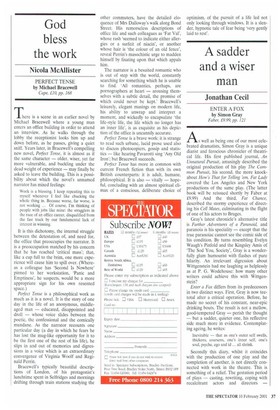God bless the work
Nicola McAllister
PERFECT TENSE by Michael Bracewell Cape, £10, pp. 168 here is a scene in an earlier novel by Michael Bracewell where a young man enters an office building in order to attend an interview. As he walks through the lobby the receptionist looks him up and down before, as he passes, giving a quiet sniff. Years later, in Bracewell's compelling new novel, Perfect Tense, it is almost as if the same character — older, wiser, yet far more vulnerable, and buckling under the dead weight of experience — may finally be asked to leave the building. This is a possibility about which the novel's unnamed narrator has mixed feelings: Work is a blessing. I keep repeating this to myself whenever I feel like chucking the whole thing in. Because worse, far worse, is not working ... Of course, I'm thinking of people with jobs like mine: the stragglers in the race of an office career, disqualified from the fast track by our fundamental lack of interest in winning.
It is this dichotomy, the internal struggle between the detestation of, and need for, the office that preoccupies the narrator. It is a preoccupation matched by his concern that he has reached 'critical mass'; that, like a cup full to the brim, one more experience will cause him to spill over. (Whereas a colleague has 'Second Is Nowhere' pinned to her workstation, 'Panic and Emptiness', he suspects, would be a more appropriate sign for his own resented space.)
Perfect Tense is a philosophical work as much as it is a novel. It is the story of one day in the life of an anonymous, middleaged man — educated, disappointed and droll — whose voice slides between the poetic, the confessional and the comically mundane. As the narrator recounts one particular day (a day in which he fears he has lost the mug-like opportunity for it to be the first one of the rest of his life), he slips in and out of memories and digressions in a voice which is an extraordinary convergence of Virginia Woolf and Reginald Perrin.
Bracewell's typically beautiful descriptions of London, of his protagonist's lunchtime spent in Selfridges and mornings drifting through train stations studying the other commuters, have the detailed eloquence of Mrs Dalioway's walk along Bond Street. His remorseless descriptions of office life and such colleagues as 'Fat Val', whose rash 'seemed to indicate either allergies or a surfeit of niacin', or another whose hair is 'the colour of an old fence', reveal Perrin's masochistic urge to madden himself by fixating upon that which appals him.
The narrator is a besuited romantic who is out of step with the world, constantly searching for something which he is unable to find. 'All romantics, perhaps, are pornographers at heart — arousing themselves with a subtle detail, the promise of which could never be kept.' Bracewell's leisurely, elegant musings on modern life, his ability to unwrap and interpret a moment, and wickedly to encapsulate 'the life-style life, the life which no longer has an inner life', is as exquisite as his depiction of the office is uncannily accurate.
Perfect Tense is a brave work: it is strange to read such urbane, lucid prose used also to discuss photocopiers, gossip and statistics — like hearing Pavarotti sing 'Any Old Iron', but Bracewell succeeds.
Perfect Tense has more in common with current French fiction than with its own British counterparts: it is adult, humane, philosophical. It is also — vitally — hopeful, concluding with an almost spiritual climax of a conscious, deliberate choice of
optimism, of the pursuit of a life led not only looking through windows. It is a slender, hypnotic tale of fear being 'very gently laid to rest'.


































































 Previous page
Previous page